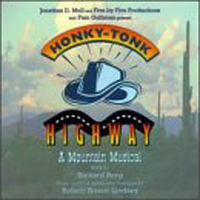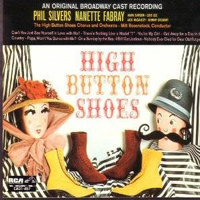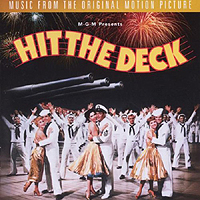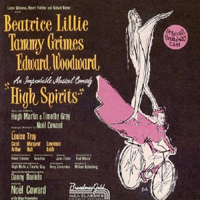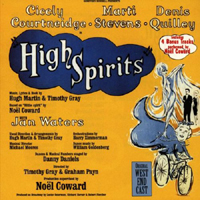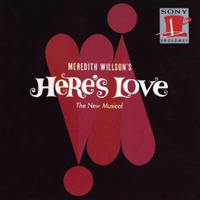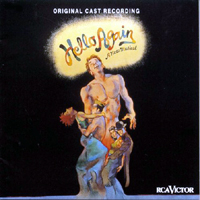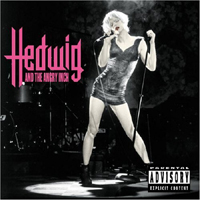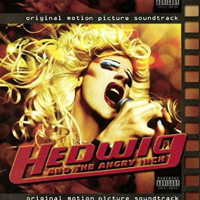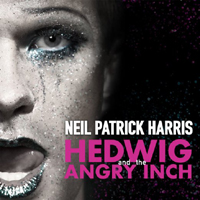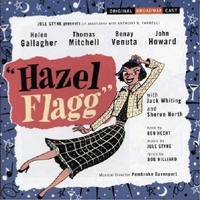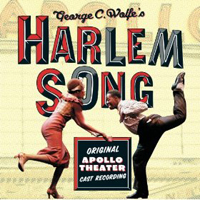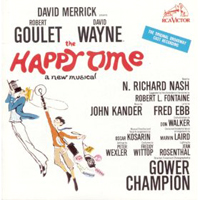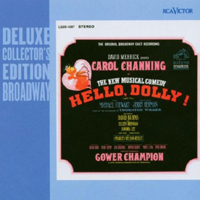 Original Broadway Cast, 1964 (RCA)
Original Broadway Cast, 1964 (RCA)  (4 / 5) If one composer’s name leaps to mind when the phrase “show tune” is used, it’s probably Jerry Herman; and if one show epitomizes Herman’s work, it’s Hello, Dolly! The “Prologue” of this recording — a brief but thrilling orchestral arrangement of the monster-hit title song, created especially for the album — sets the mood. From there to the finale, it’s treat after treat, with “Put on Your Sunday Clothes” registering as one of the most exciting songs ever written for the American musical theater. There are a couple of grammatical errors in the show’s lyrics — e.g., “I have always been a woman who arranges things, for the pleasure and the profit it derives.” But this is a wonderful score, and the original cast recording is a cornerstone of many people’s collections, even if the whole is greater than the sum of its parts. Charles Nelson Reilly, so delightful in the comic character role of Bud Frump in How to Succeed in Business Without Really Trying, is less persuasive here as the more leading-mannish Cornelius Hackl. Opposite him, Eileen Brennan sings “Ribbons Down My Back” and other songs in a stilted soprano that worked for her campy role in Little Mary Sunshine but is inappropriate for the straightforward Irene Molloy. On the plus side, David Burns is fun in what little he gets to sing as Horace Vandergelder. Of course, the main attraction here is Carol Channing’s portrayal of Dolly Gallagher Levi — a one-of-a-kind, daffy, brilliantly comic performance. The chorus members sing with energy, but in an oddly clipped fashion that sometimes makes them sound angry; however, the orchestra is terrific throughout as recorded in super-duper stereo. (Shepard Coleman is listed as musical director/vocal arranger.) Note that the songs “Motherhood” and “Elegance” were written at least in part by Bob Merrill, who pitched in when the show was in trouble out of town pre-Broadway. Included as bonus tracks on the “Broadway Deluxe Collector’s Edition” CD are two cuts each from the London cast album starring Mary Martin and the 1967 Broadway cast album starring Pearl Bailey, plus Ethel Merman’s renditions (with piano accompaniment) of two songs that were reinstated when she starred as Dolly at the end of the show’s seven-year Broadway run. There’s also an amusing interview with Carol Channing. — Michael Portantiere
(4 / 5) If one composer’s name leaps to mind when the phrase “show tune” is used, it’s probably Jerry Herman; and if one show epitomizes Herman’s work, it’s Hello, Dolly! The “Prologue” of this recording — a brief but thrilling orchestral arrangement of the monster-hit title song, created especially for the album — sets the mood. From there to the finale, it’s treat after treat, with “Put on Your Sunday Clothes” registering as one of the most exciting songs ever written for the American musical theater. There are a couple of grammatical errors in the show’s lyrics — e.g., “I have always been a woman who arranges things, for the pleasure and the profit it derives.” But this is a wonderful score, and the original cast recording is a cornerstone of many people’s collections, even if the whole is greater than the sum of its parts. Charles Nelson Reilly, so delightful in the comic character role of Bud Frump in How to Succeed in Business Without Really Trying, is less persuasive here as the more leading-mannish Cornelius Hackl. Opposite him, Eileen Brennan sings “Ribbons Down My Back” and other songs in a stilted soprano that worked for her campy role in Little Mary Sunshine but is inappropriate for the straightforward Irene Molloy. On the plus side, David Burns is fun in what little he gets to sing as Horace Vandergelder. Of course, the main attraction here is Carol Channing’s portrayal of Dolly Gallagher Levi — a one-of-a-kind, daffy, brilliantly comic performance. The chorus members sing with energy, but in an oddly clipped fashion that sometimes makes them sound angry; however, the orchestra is terrific throughout as recorded in super-duper stereo. (Shepard Coleman is listed as musical director/vocal arranger.) Note that the songs “Motherhood” and “Elegance” were written at least in part by Bob Merrill, who pitched in when the show was in trouble out of town pre-Broadway. Included as bonus tracks on the “Broadway Deluxe Collector’s Edition” CD are two cuts each from the London cast album starring Mary Martin and the 1967 Broadway cast album starring Pearl Bailey, plus Ethel Merman’s renditions (with piano accompaniment) of two songs that were reinstated when she starred as Dolly at the end of the show’s seven-year Broadway run. There’s also an amusing interview with Carol Channing. — Michael Portantiere
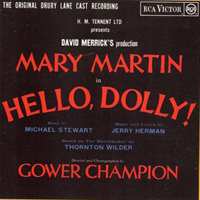 Original London Cast, 1965 (RCA/ArkivMusic)
Original London Cast, 1965 (RCA/ArkivMusic)  (4 / 5) The “Original London Cast Recording” designation is accurate in the sense that this album does represent the cast of Hello, Dolly! as the show was first seen in London. But the company is actually that of the international touring production, headed by Mary Martin, a true legend of the American musical theater. Martin apparently declined to have her music transposed downward to accommodate a lowering of her vocal range as she aged, so there are a few less-than-lovely high notes heard here. Still, this beloved performer is so charming in Dolly Levi’s songs that these limitations don’t seem to matter much. The supporting cast is of variable quality: Garrett Lewis doesn’t really have enough voice for Cornelius, but Loring Smith is fine as Vandergelder, and Marilyn Lovell is very appealing and sings fetchingly as Irene. — M.P.
(4 / 5) The “Original London Cast Recording” designation is accurate in the sense that this album does represent the cast of Hello, Dolly! as the show was first seen in London. But the company is actually that of the international touring production, headed by Mary Martin, a true legend of the American musical theater. Martin apparently declined to have her music transposed downward to accommodate a lowering of her vocal range as she aged, so there are a few less-than-lovely high notes heard here. Still, this beloved performer is so charming in Dolly Levi’s songs that these limitations don’t seem to matter much. The supporting cast is of variable quality: Garrett Lewis doesn’t really have enough voice for Cornelius, but Loring Smith is fine as Vandergelder, and Marilyn Lovell is very appealing and sings fetchingly as Irene. — M.P.
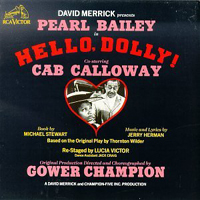 Broadway Cast, 1967 (RCA)
Broadway Cast, 1967 (RCA)  (5 / 5) In order to rekindle interest in Hello, Dolly! three years into the show’s run, producer David Merrick brought in an all-black company headed by two iconic performers, Pearl Bailey and Cab Calloway. The exemplary cast album begins with a gorgeous, full-length overture that’s almost too symphonic for this basically light and bouncy show; like the “Prologue” of the original cast album, it was created specifically for the recording. Philip J. Lang’s revamped orchestrations are fabulous, and the performance of the title song is the best ever recorded: Bailey and the male chorus have the time of their lives as saxophones wail, trumpets blare, a banjo strums, and the xylophone player goes nuts. As Dolly, Bailey is a real pistol and very funny as required, but she’s just as strong when delivering the more emotionally weighty “Before the Parade Passes By.” Calloway makes the role of Horace Vandergelder wonderfully his own, even if he’s only heard leading the male-ensemble number “It Takes a Woman” and in the reprise duet of “Hello, Dolly!” with Bailey. Jack Crowder’s rich baritone voice isn’t exactly right for the callow Cornelius, but Crowder sings so beautifully — especially in “It Only Takes a Moment,” one of Herman’s loveliest ballads — that it would be foolish to carp. He’s superbly partnered by Emily Yancy, who brings just enough jazz/pop style to Irene’s songs to make them seem fresh without distortion. By a considerable margin, this is the finest recording of the Hello, Dolly! score. — M.P.
(5 / 5) In order to rekindle interest in Hello, Dolly! three years into the show’s run, producer David Merrick brought in an all-black company headed by two iconic performers, Pearl Bailey and Cab Calloway. The exemplary cast album begins with a gorgeous, full-length overture that’s almost too symphonic for this basically light and bouncy show; like the “Prologue” of the original cast album, it was created specifically for the recording. Philip J. Lang’s revamped orchestrations are fabulous, and the performance of the title song is the best ever recorded: Bailey and the male chorus have the time of their lives as saxophones wail, trumpets blare, a banjo strums, and the xylophone player goes nuts. As Dolly, Bailey is a real pistol and very funny as required, but she’s just as strong when delivering the more emotionally weighty “Before the Parade Passes By.” Calloway makes the role of Horace Vandergelder wonderfully his own, even if he’s only heard leading the male-ensemble number “It Takes a Woman” and in the reprise duet of “Hello, Dolly!” with Bailey. Jack Crowder’s rich baritone voice isn’t exactly right for the callow Cornelius, but Crowder sings so beautifully — especially in “It Only Takes a Moment,” one of Herman’s loveliest ballads — that it would be foolish to carp. He’s superbly partnered by Emily Yancy, who brings just enough jazz/pop style to Irene’s songs to make them seem fresh without distortion. By a considerable margin, this is the finest recording of the Hello, Dolly! score. — M.P.
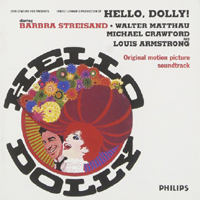 Film Soundtrack, 1969 (20th Century-Fox/Philips)
Film Soundtrack, 1969 (20th Century-Fox/Philips)  (2 / 5) Barbra Streisand’s voice was at its zenith at the time of this recording, which may be enjoyed for the sheer pleasure of hearing her sing these songs, even if she does so in a style very different from that of her predecessors in the role of Dolly Levi. Two of her best numbers are “So Long, Dearie,” heard here in a terrific, way-up-tempo arrangement; and “Just Leave Everything to Me,” a new song that was written for the film to replace “I Put My Hand In” from the stage score. Streisand also sounds great in the title song and “Before the Parade Passes By,” although her ultra-slow delivery of the first sections of both songs will not be to everyone’s taste. Walter Matthau is no great shakes as a singer, but he does well enough in Horace Vandergelder’s one-and-a-half numbers, and is quite funny in the part. The greatest liability of the recording is Michael Crawford’s high, thin, cartoonish voice, extremely off-putting in “Put On Your Sunday Clothes,” “It Only Takes a Moment,” and Cornelius’s other songs. Whoever dubbed the singing for Marianne McAndrew as Irene Molloy sounds lovely, if a bit bland. On a very positive note, it’s a gift to have the legendary Louis Armstrong on hand for one chorus of the title song as a memento of his hit recording from the time of the show’s opening on Broadway. The arrangements and conducting, by the well-respected Lennie Hayton and Lionel Newman, are fine for the most part. But given Streisand’s odd casting and Crawford’s extremely weird sound, this recording is far from definitive. — M.P.
(2 / 5) Barbra Streisand’s voice was at its zenith at the time of this recording, which may be enjoyed for the sheer pleasure of hearing her sing these songs, even if she does so in a style very different from that of her predecessors in the role of Dolly Levi. Two of her best numbers are “So Long, Dearie,” heard here in a terrific, way-up-tempo arrangement; and “Just Leave Everything to Me,” a new song that was written for the film to replace “I Put My Hand In” from the stage score. Streisand also sounds great in the title song and “Before the Parade Passes By,” although her ultra-slow delivery of the first sections of both songs will not be to everyone’s taste. Walter Matthau is no great shakes as a singer, but he does well enough in Horace Vandergelder’s one-and-a-half numbers, and is quite funny in the part. The greatest liability of the recording is Michael Crawford’s high, thin, cartoonish voice, extremely off-putting in “Put On Your Sunday Clothes,” “It Only Takes a Moment,” and Cornelius’s other songs. Whoever dubbed the singing for Marianne McAndrew as Irene Molloy sounds lovely, if a bit bland. On a very positive note, it’s a gift to have the legendary Louis Armstrong on hand for one chorus of the title song as a memento of his hit recording from the time of the show’s opening on Broadway. The arrangements and conducting, by the well-respected Lennie Hayton and Lionel Newman, are fine for the most part. But given Streisand’s odd casting and Crawford’s extremely weird sound, this recording is far from definitive. — M.P.
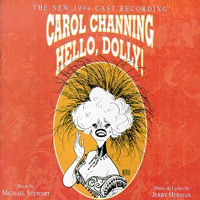 Touring/Broadway Cast, 1994 (Varèse Sarabande)
Touring/Broadway Cast, 1994 (Varèse Sarabande)  (1 / 5) Here’s an unfortunate cast album of a mid-’90s touring production that eventually got to Broadway. It was recorded when star Carol Channing was over 70, and she sounds even older here; this reviewer heard better singing from her several years later, so she must have been tired and/or under the weather for the recording sessions. Jay Garner is lots of fun as Vandergelder, and Michael DeVries, with his ringing tenor, is happily cast as Cornelius, but the uncontrolled belting of Florence Lacey is all wrong for Irene’s songs. The orchestra sounds relatively small and is not well recorded, with the percussion far too prominent. Skip it. — M.P.
(1 / 5) Here’s an unfortunate cast album of a mid-’90s touring production that eventually got to Broadway. It was recorded when star Carol Channing was over 70, and she sounds even older here; this reviewer heard better singing from her several years later, so she must have been tired and/or under the weather for the recording sessions. Jay Garner is lots of fun as Vandergelder, and Michael DeVries, with his ringing tenor, is happily cast as Cornelius, but the uncontrolled belting of Florence Lacey is all wrong for Irene’s songs. The orchestra sounds relatively small and is not well recorded, with the percussion far too prominent. Skip it. — M.P.
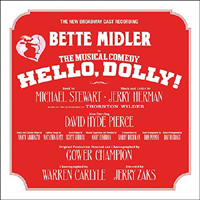 Broadway Cast, 2017 (Masterworks Broadway)
Broadway Cast, 2017 (Masterworks Broadway)  (3 / 5) This recording does a fairly decent job of capturing what was so special about one of the biggest hit musical revivals in Broadway history. Bette Midler brings her sparkling comic personality and unique vocal inflections to the role of Dolly Gallagher Levi, but her singing voice isn’t in great shape on the recording, and when she’s required to sustain a note for more than a beat or two, her sound is often less than pleasant. (Hear, for example, the opening section of “Before the Parade Passes By.”) Another slight disappointment of the album is that Andy Einhorn conducts certain parts of the score just enough under tempo to lower the excitement level, and while the chorus sings with great beauty and lots of heart throughout, they’re recorded in an acoustic that sounds slightly recessed. On the plus side, David Hyde Pierce is a delightful Horace Vandergelder; he makes a meal of the restored song “Penny in My Pocket,” further scoring with “It Takes a Woman” and his sweet rendition of half a chorus of “Hello, Dolly!” for the finale. Gavin Creel sings so beautifully and persuasively here that he earns the “Best Cornelius on Records” award. Kate Baldwin, also blessed with a gorgeous voice, does a far better job of mixing chest and head tones in Irene Molloy’s songs than Florence Lacey did. The new orchestrations by Larry Hochman are fine, but they don’t improve on the originals by Philip J. Lang, and the new overture is lackluster. While Steven Suskin’s notes in the CD booklet are highly entertaining and filled with fascinating facts about the history of Hello, Dolly! from the show’s genesis through this revival, Suskin avoids mention of the fact that at least two of the score’s songs were written at least in part by people other than Jerry Herman while the show was being doctored out of town prior to its Broadway opening. Nor does he note that Herman settled out of court a claim that the first part of the melody of the title song was borrowed from an old ditty called “Sunflower.” Although on one level it’s understandable why this information was not included here, it’s still a significant omission in that the essay is otherwise so very thorough. — M.P.
(3 / 5) This recording does a fairly decent job of capturing what was so special about one of the biggest hit musical revivals in Broadway history. Bette Midler brings her sparkling comic personality and unique vocal inflections to the role of Dolly Gallagher Levi, but her singing voice isn’t in great shape on the recording, and when she’s required to sustain a note for more than a beat or two, her sound is often less than pleasant. (Hear, for example, the opening section of “Before the Parade Passes By.”) Another slight disappointment of the album is that Andy Einhorn conducts certain parts of the score just enough under tempo to lower the excitement level, and while the chorus sings with great beauty and lots of heart throughout, they’re recorded in an acoustic that sounds slightly recessed. On the plus side, David Hyde Pierce is a delightful Horace Vandergelder; he makes a meal of the restored song “Penny in My Pocket,” further scoring with “It Takes a Woman” and his sweet rendition of half a chorus of “Hello, Dolly!” for the finale. Gavin Creel sings so beautifully and persuasively here that he earns the “Best Cornelius on Records” award. Kate Baldwin, also blessed with a gorgeous voice, does a far better job of mixing chest and head tones in Irene Molloy’s songs than Florence Lacey did. The new orchestrations by Larry Hochman are fine, but they don’t improve on the originals by Philip J. Lang, and the new overture is lackluster. While Steven Suskin’s notes in the CD booklet are highly entertaining and filled with fascinating facts about the history of Hello, Dolly! from the show’s genesis through this revival, Suskin avoids mention of the fact that at least two of the score’s songs were written at least in part by people other than Jerry Herman while the show was being doctored out of town prior to its Broadway opening. Nor does he note that Herman settled out of court a claim that the first part of the melody of the title song was borrowed from an old ditty called “Sunflower.” Although on one level it’s understandable why this information was not included here, it’s still a significant omission in that the essay is otherwise so very thorough. — M.P.
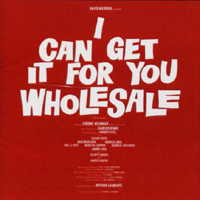 Original Broadway Cast, 1962 (Columbia/Sony)
Original Broadway Cast, 1962 (Columbia/Sony)  (3 / 5) This show has gone down in history for having launched the career of Barbra Streisand, but there’s so much more here. Jerome Weidman adapted his own novel about a Seventh Avenue go-getter who sells his soul for shmattehs. Composer-lyricist Harold Rome’s score percolates with energy. Elliot Gould stars as schemer Harry Bogen, displaying plenty of nasty vitality in numbers like “The Way Things Are” and “The Sound of Money.” This is, however, an ensemble show filled with vividly etched character portraits. Marilyn Cooper, as the girl who loves Harry, delivers two wry ballads: “When Gemini Meets Capricorn” and “Who Knows?” Ken Le Roy and Bambi Linn, as a dress designer and his wife, deliver the lovely “Have I Told You Lately?” Lillian Roth, as Harry’s doting mother, offers chicken soup for the soul in the introspective “Too Soon” and the chilling “Eat a Little Something.” And yes, Streisand hits the comedy number “Miss Marmelstein” out of the park. Rome’s lyrics evoke a world of middle-class Jews who work in the garment trade, while his music merges jazz with Yiddish harmonies and a touch of Leonard Bernstein. Sid Rarnin’s percussive orchestrations are among the most unique of the period. It’s an underrated, distinctive achievement. — David Barbour
(3 / 5) This show has gone down in history for having launched the career of Barbra Streisand, but there’s so much more here. Jerome Weidman adapted his own novel about a Seventh Avenue go-getter who sells his soul for shmattehs. Composer-lyricist Harold Rome’s score percolates with energy. Elliot Gould stars as schemer Harry Bogen, displaying plenty of nasty vitality in numbers like “The Way Things Are” and “The Sound of Money.” This is, however, an ensemble show filled with vividly etched character portraits. Marilyn Cooper, as the girl who loves Harry, delivers two wry ballads: “When Gemini Meets Capricorn” and “Who Knows?” Ken Le Roy and Bambi Linn, as a dress designer and his wife, deliver the lovely “Have I Told You Lately?” Lillian Roth, as Harry’s doting mother, offers chicken soup for the soul in the introspective “Too Soon” and the chilling “Eat a Little Something.” And yes, Streisand hits the comedy number “Miss Marmelstein” out of the park. Rome’s lyrics evoke a world of middle-class Jews who work in the garment trade, while his music merges jazz with Yiddish harmonies and a touch of Leonard Bernstein. Sid Rarnin’s percussive orchestrations are among the most unique of the period. It’s an underrated, distinctive achievement. — David Barbour Off-Broadway Cast, 2023 (Concord Theatricals)
Off-Broadway Cast, 2023 (Concord Theatricals)  (4 / 5) This cast recording of an Off-Broadway revisal of I Can Get It For You Wholesale was released belatedly, more than a year after the show completed its limited run in December 2023, but it’s a wonderful opportunity to revisit Harold Rome’s underrated score. Tony Award-winner Santino Fontana leads the company as the ambitious heel Harry Bogen, bringing to the role a higher level of vocal talent than Elliot Gould displays on the original cast album. Rebecca Naomi Jones does a fine job with all of Ruthie’s stellar solo moments, sounding particularly sweet in “Who Knows?” In addition, Jones gets a song not included on the 1962 recording: a bubbly duet, titled “Grab Them While I Can / A Gift Is Not Enough,” for Ruthie and Bogen’s other love interest, Martha (superbly portrayed by Joy Woods). Adam Chanler-Berat and Sarah Steele add some panache with their rendition of the soft-shoe ditty “Have I Told You Lately?” As if our cups weren’t already running over, Judy Kuhn is on hand as Mrs. Bogen, Harry’s adoring mother. Although she’s not afforded an opportunity to fully show off her vocal mettle here, Kuhn sings hauntingly in “Too Soon” and “Eat A Little Something.” Taking on Barbara Streisand’s breakout role of Miss Marmelstein, Julia Lester is zany and full of personality, and if her interpretation isn’t quite equal to Streisand’s (how could it be?), it’s distinctive in its own right and worthy of praise. This revisal reshuffled the order of some of the songs as compared to the original production, and there were some cuts and other changes. (The production featured book revisions by Jerome Weidman’s son, John Weidman, best known for his work on the Stephen Sondheim musicals Pacific Overtures, Assassins, and Road Show.) Jacinth Greywoode’s orchestrations are simple and charming, even if they can’t be wholeheartedly recommended over the fuller versions heard on the Broadway cast album. Note: Concord released this recording in streaming format only, but included a full and well-designed booklet as a free download. — Forrest Hutchinson
(4 / 5) This cast recording of an Off-Broadway revisal of I Can Get It For You Wholesale was released belatedly, more than a year after the show completed its limited run in December 2023, but it’s a wonderful opportunity to revisit Harold Rome’s underrated score. Tony Award-winner Santino Fontana leads the company as the ambitious heel Harry Bogen, bringing to the role a higher level of vocal talent than Elliot Gould displays on the original cast album. Rebecca Naomi Jones does a fine job with all of Ruthie’s stellar solo moments, sounding particularly sweet in “Who Knows?” In addition, Jones gets a song not included on the 1962 recording: a bubbly duet, titled “Grab Them While I Can / A Gift Is Not Enough,” for Ruthie and Bogen’s other love interest, Martha (superbly portrayed by Joy Woods). Adam Chanler-Berat and Sarah Steele add some panache with their rendition of the soft-shoe ditty “Have I Told You Lately?” As if our cups weren’t already running over, Judy Kuhn is on hand as Mrs. Bogen, Harry’s adoring mother. Although she’s not afforded an opportunity to fully show off her vocal mettle here, Kuhn sings hauntingly in “Too Soon” and “Eat A Little Something.” Taking on Barbara Streisand’s breakout role of Miss Marmelstein, Julia Lester is zany and full of personality, and if her interpretation isn’t quite equal to Streisand’s (how could it be?), it’s distinctive in its own right and worthy of praise. This revisal reshuffled the order of some of the songs as compared to the original production, and there were some cuts and other changes. (The production featured book revisions by Jerome Weidman’s son, John Weidman, best known for his work on the Stephen Sondheim musicals Pacific Overtures, Assassins, and Road Show.) Jacinth Greywoode’s orchestrations are simple and charming, even if they can’t be wholeheartedly recommended over the fuller versions heard on the Broadway cast album. Note: Concord released this recording in streaming format only, but included a full and well-designed booklet as a free download. — Forrest Hutchinson


 (2 / 5) This show flopped big-time when producer Joseph Papp transferred it to Broadway after a run at his Public Theater. Although billed as “a modern opera by Galt MacDermot and William Dumaresq,” The Human Comedy is really more of an oratorio, complete with a Greek-style chorus. Based on a novel by William Saroyan, this musical tale of a small-town American family during World War II is highly sentimental. Some of the lyrics are poetic, but many are awkward or even nonsensical — for example, “Your voice is in fine, fine fetter.” (What?) However, MacDermot’s music is divine throughout. Among the many highlights: “Ulysses Reaches the Crossing,” “Beautiful Music,” “I’ve Known a Lot of Guys,” and the boogie-woogie duet “I Let Him Kiss Me Once.” The score contains at least two hymns, “When I Am Lost” and “Everlasting,” that have absolutely nothing to do with the action, but they’re so lovely that you probably won’t mind. The cast is a mixed bag: Bonnie Koloc, Stephen Geoffreys, Mary Elizabeth Mastrantonio, and Don Kehr are all fine as various Macauley family members. Also good are Leata Galloway as Diana Steed, Caroline Peyton as Mary Arena, and David Johnson as the trainman. On the other hand, young Josh Blake is almost unlistenable as Ulysses Macauley, and Rex Smith is vocally miscast as Spangler. The sound quality of the recording is odd; apparently, it was made onstage with no audience present. As for the CD edition, be aware that, for some reason, the two discs are not tracked at all, so the only way to access particular songs is to use search buttons on your player. Contributing to the slapdash feel of the enterprise, the accompanying booklet leaves out the recording date and repeatedly misspells Saroyan’s name (as “Saroyen”). The Human Comedy definitely deserves to be heard but, given all that’s wrong with the expensive, privately produced CD set, you’d be better off purchasing the recording in MP3 format. — Michael Portantiere
(2 / 5) This show flopped big-time when producer Joseph Papp transferred it to Broadway after a run at his Public Theater. Although billed as “a modern opera by Galt MacDermot and William Dumaresq,” The Human Comedy is really more of an oratorio, complete with a Greek-style chorus. Based on a novel by William Saroyan, this musical tale of a small-town American family during World War II is highly sentimental. Some of the lyrics are poetic, but many are awkward or even nonsensical — for example, “Your voice is in fine, fine fetter.” (What?) However, MacDermot’s music is divine throughout. Among the many highlights: “Ulysses Reaches the Crossing,” “Beautiful Music,” “I’ve Known a Lot of Guys,” and the boogie-woogie duet “I Let Him Kiss Me Once.” The score contains at least two hymns, “When I Am Lost” and “Everlasting,” that have absolutely nothing to do with the action, but they’re so lovely that you probably won’t mind. The cast is a mixed bag: Bonnie Koloc, Stephen Geoffreys, Mary Elizabeth Mastrantonio, and Don Kehr are all fine as various Macauley family members. Also good are Leata Galloway as Diana Steed, Caroline Peyton as Mary Arena, and David Johnson as the trainman. On the other hand, young Josh Blake is almost unlistenable as Ulysses Macauley, and Rex Smith is vocally miscast as Spangler. The sound quality of the recording is odd; apparently, it was made onstage with no audience present. As for the CD edition, be aware that, for some reason, the two discs are not tracked at all, so the only way to access particular songs is to use search buttons on your player. Contributing to the slapdash feel of the enterprise, the accompanying booklet leaves out the recording date and repeatedly misspells Saroyan’s name (as “Saroyen”). The Human Comedy definitely deserves to be heard but, given all that’s wrong with the expensive, privately produced CD set, you’d be better off purchasing the recording in MP3 format. — Michael Portantiere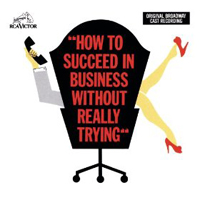
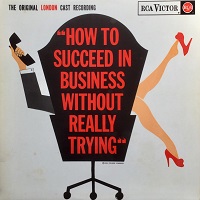
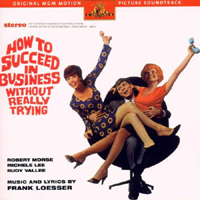
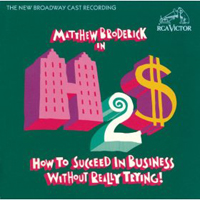
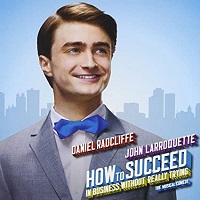
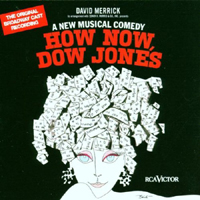
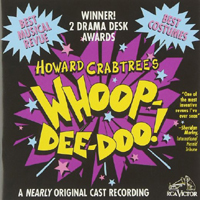
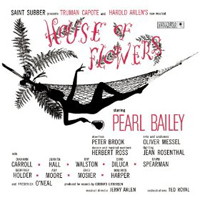
 (5 / 5) The cast album of Harold Arlen and Truman Capote’s flop musical set in a West Indian bordello is stunning and unique; the steel drums and whistles of the overture announce a 1950s musical with a sound like no other. The opening number, for the girls of the house, promises an unusual frankness for the era, and Capote’s lyrics (“Drowsin’, dreamin,’ moonbeamin’ / ’bout the thing we’re supreme in”) are amazing for a beginner. Pearl Bailey, owning the show as Madame Fleur, throws her weight around in “One Man Ain’t Quite Enough” and caps the number with an outrageous ad lib that passed instantly into cast-album legend. A teenage Diahann Carroll, nursing a cold for the recording session, nonetheless oozes charm and unselfconscious allure in “A Sleepin’ Bee.” And that’s just the first 15 minutes! (More oddball cast album history is made later, when Carroll’s voice gives out near the end of “I Never Has Seen Snow” and Arlen has to dub a high note for her.) It’s a spellbinding score with quirky orchestrations by Ted Royal, thrillingly conducted by Jerry Arlen. For the 2003 CD reissue of this treasured recording, Columbia/Sony remastered everything and made the audio crisper; put the songs in their stage order; found a longer, more sumptuous take of “Mardi Gras”; let the tape run a few seconds longer on “Wait’in'”; and inserted a “Mardi Gras Waltz” from a Percy Faith album. There are other bonus tracks — a single of “Two Ladies in de Shade of de Banana Tree” by cast member Enid Mosier, a tape of Arlen’s first draft of “A Sleepin’ Bee,” and Capote reading an excerpt from his source-material short story — plus a booklet that contains some photos from the gorgeous original production. The cumulative effect is compelling. For a half-century, people have heard this amazing score and wondered why such a show failed. We’re lucky, at least, that House of Flowers yielded one of the great cast albums. — Marc Miller
(5 / 5) The cast album of Harold Arlen and Truman Capote’s flop musical set in a West Indian bordello is stunning and unique; the steel drums and whistles of the overture announce a 1950s musical with a sound like no other. The opening number, for the girls of the house, promises an unusual frankness for the era, and Capote’s lyrics (“Drowsin’, dreamin,’ moonbeamin’ / ’bout the thing we’re supreme in”) are amazing for a beginner. Pearl Bailey, owning the show as Madame Fleur, throws her weight around in “One Man Ain’t Quite Enough” and caps the number with an outrageous ad lib that passed instantly into cast-album legend. A teenage Diahann Carroll, nursing a cold for the recording session, nonetheless oozes charm and unselfconscious allure in “A Sleepin’ Bee.” And that’s just the first 15 minutes! (More oddball cast album history is made later, when Carroll’s voice gives out near the end of “I Never Has Seen Snow” and Arlen has to dub a high note for her.) It’s a spellbinding score with quirky orchestrations by Ted Royal, thrillingly conducted by Jerry Arlen. For the 2003 CD reissue of this treasured recording, Columbia/Sony remastered everything and made the audio crisper; put the songs in their stage order; found a longer, more sumptuous take of “Mardi Gras”; let the tape run a few seconds longer on “Wait’in'”; and inserted a “Mardi Gras Waltz” from a Percy Faith album. There are other bonus tracks — a single of “Two Ladies in de Shade of de Banana Tree” by cast member Enid Mosier, a tape of Arlen’s first draft of “A Sleepin’ Bee,” and Capote reading an excerpt from his source-material short story — plus a booklet that contains some photos from the gorgeous original production. The cumulative effect is compelling. For a half-century, people have heard this amazing score and wondered why such a show failed. We’re lucky, at least, that House of Flowers yielded one of the great cast albums. — Marc Miller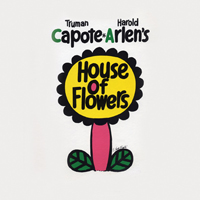
 (1 / 5) Original producer Saint Subber unwisely ordered a major rewrite of House of Flowers for a new, scaled-down Off-Broadway production that yielded this cast album in shrill stereo. Here, the islanders appear more willfully ignorant than disarmingly unworldly. Some great songs (“One Man Ain’t Quite Enough,” “Genna Leave Off Wearin’ My Shoes”) are missing, some lackluster new ones (not entirely by Harold Arlen and Truman Capote) are inserted, and the modest calypso-band arrangements sound like toy whistles next to Ted Royal’s great originals. The musical director, Joe Raposo, plays it so safe that it sounds like he’s warming up for Sesame Street. It’s not the cast’s fault: Yolande Bavan is a charming Ottilie, Thelma Oliver and Hope Clarke are lusty sidekicks, and Novella Nelson gamely grunts out something called “Madame Tango’s Particular Tango.” Replacing Pearl Bailey as Madame Fleur, Josephine Premice is deprived of some of the character’s best material; “Don’t Like Goodbyes,’ which was evidently written for Ottilie and swiped by Bailey, is here restored to its rightful owner. Premice’s unidentifiable accent and inimitable, scratchy singing are ingratiating, but the squirm-inducing moments in this wilted Flowers far outweigh the soul-satisfying ones. If there’s an object lesson in how to ruin a classic score, here it is. — M.M.
(1 / 5) Original producer Saint Subber unwisely ordered a major rewrite of House of Flowers for a new, scaled-down Off-Broadway production that yielded this cast album in shrill stereo. Here, the islanders appear more willfully ignorant than disarmingly unworldly. Some great songs (“One Man Ain’t Quite Enough,” “Genna Leave Off Wearin’ My Shoes”) are missing, some lackluster new ones (not entirely by Harold Arlen and Truman Capote) are inserted, and the modest calypso-band arrangements sound like toy whistles next to Ted Royal’s great originals. The musical director, Joe Raposo, plays it so safe that it sounds like he’s warming up for Sesame Street. It’s not the cast’s fault: Yolande Bavan is a charming Ottilie, Thelma Oliver and Hope Clarke are lusty sidekicks, and Novella Nelson gamely grunts out something called “Madame Tango’s Particular Tango.” Replacing Pearl Bailey as Madame Fleur, Josephine Premice is deprived of some of the character’s best material; “Don’t Like Goodbyes,’ which was evidently written for Ottilie and swiped by Bailey, is here restored to its rightful owner. Premice’s unidentifiable accent and inimitable, scratchy singing are ingratiating, but the squirm-inducing moments in this wilted Flowers far outweigh the soul-satisfying ones. If there’s an object lesson in how to ruin a classic score, here it is. — M.M.